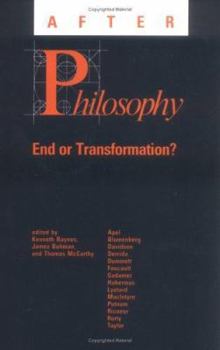After Philosophy: End or Transformation?
Select Format
Select Condition 
Book Overview
After Philosophy provides an excellent framework for understanding the most important strains of current philosophical work in North America, England, France, and Germany. The selections from the work of fourteen contemporary philosophers not only display the multiplicity of approaches being pursued since the breakup of any consensus on what philosophy is, but also help to clarify this proliferation of views and to spell out today's basic options for doing, or not doing, philosophy today. With a general introduction delineating what is in dispute between the different parties to the end-of-philosophy debates, brief introductions to the thought of each author, and suggestions for further reading following each selection, After Philosophy is ideally suited for use in any course that includes an overview of the bewildering variety of contemporary approaches to philosophy. Major Sections and Contributors I. The End of Philosophy. Richard Rorty Jean-Fran ois Lyotard, Michel Foucault, Jacques Derrida . II. The Transformation of Philosophy: Systematic Proposals. Donald Davidson, Michael Dummett, Hilary Putnam, Karl-Otto Apel, J rgen Habermas . III. The Transformation of Philosophy: Hermeneutics, Narrative, Rhetoric. Hans-Georg Gadamer, Paul Ricoeur, Alasdair Maclntyre, Hans Blumenberg, Charles Taylor .
Format:Paperback
Language:English
ISBN:026252113X
ISBN13:9780262521130
Release Date:November 1986
Publisher:MIT Press
Length:300 Pages
Weight:1.45 lbs.
Dimensions:1.0" x 5.9" x 9.0"
Age Range:18 years and up
Grade Range:Postsecondary and higher
Customer Reviews
1 rating
A collection of transformations....but with no fixed points
Published by Thriftbooks.com User , 21 years ago
The pages in this book are enclosed in cover, but it has no beginning and no ending. It is a sign, a mirror, a reflection, of an unending dialog that has trickled its way through Western culture for thousands of years. This dialog has been at times contentious, rich in symbolisms and thought experiments, and executing always a random walk through conceptual space. This book is one of thousands throughout history that have attempted to find rest, to find a fixed point in a dynamical system of words and thoughts that the West has called "philosophy". There has been no paucity of ideas and energy in this unrelenting search for this elusive equilibrium called Truth. The search algorithms have employed the ultimate in human imagination and logic, and have been executed without yet any indication of completion. Unable to find a resting point that is deemed comfortable to all, a few of the bricklayers of thought we called "philosophers" have abandoned the search for it. This book gives the reader a sample of them. When picked up and opened, one learns of: The pragmatic post-philosophical culture of Richard Rorty, wherein man and woman are alone and finite, and have "no links to beyond"; where science is an inquiry just as is literature. In this culture, opponents in thought cannot find resolution according to criteria agreed to by both sides. The "principle of legitimacy" and "narrativity" of the French Nietzschean Jean-Francois Lyotard, with its bricklaying tool the pragmatics of language courtesy of Wittgenstein. Dialog for Lyotard is a kind of war, albeit a "playful" one. All speech is thus in the domain of "agonistics". But the language games via computerization, he asserts, can be a dream instrument for controlling and regulating the market system. But the computerization can supply groups with the information needed to make knowledgeable decisions. Language games are then non-zero-sum games of perfect information, where minimax equilibria are not to be found. After all, the reserve of knowledge and utterances are inexhaustible. Lyotard has stumbled upon a possible dialog of 21st century ethics: a playful argumentation with the machine. The "counterphilosophy" of another French Nietzschean, Michel Foucault. Foucault is a bricklayer though who uses power tools. But power is essentially positive, and not to be masked by the human sciences or individual self-knowledge. These create a facade of universality and objectivity. For Foucault, (true?) intellectuals participate in a "local" struggle, namely to detach the power of truth from its modern forms of hegemony. The deconstruction of the (self-professing bricoleur) Jacques Derrida. Derrida's bricks are never laid. Instead, he removes the gout between the ones that are already set in the buildings of Western metaphysics. The semantic transformation of metaphysics of Donald Davidson. Davidson's bricks are tainted with common sense: he believes that communication dictates that most of our beliefs






